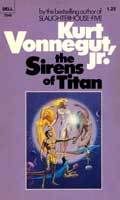Quote Of The Day: Kurt On Ice Nine Edition
"There was never a kinder and, at the same time, wittier writer to be with personally. He was just a gem in that respect. And as a writer, I guess he's the closest thing we had to a Voltaire. He could be extremely funny, but there was a vein of iron always underneath it, which made him quite remarkable. He was never funny just to be funny." -- Tom Wolfe on Kurt Vonnegut
 It's been hard to like Kurt Vonnegut much in recent years.
It's been hard to like Kurt Vonnegut much in recent years.As he aged, not too gracefully, more and more he personified to me a segment of our population that is very troubling: Men and women who lived through and fought in World War II and did a heck of a job saving Democracy and freedom, but how wish to deny us the right to continue that fight in the face of Islamofascism.
Here's a snippet from an interview he gave in 2003 to In These Times:
I myself feel that our country, for whose Constitution I fought in a just war, might as well have been invaded by Martians and body snatchers. Sometimes I wish it had been. What has happened, though, is that it has been taken over by means of the sleaziest, low-comedy, Keystone Cops-style coup d’etat imaginable. And those now in charge of the federal government are upper-crust C-students who know no history or geography, plus not-so-closeted white supremacists, aka “Christians” ...What made his war just and this war not just? What fundamental difference is there between fascism and Islamofascism that he, my mother and many others of that generation apparently see very clearly but I don't see at all? (Besides, pick up Slaughterhouse Five and ask yourself if Vonnegut really felt his war was just. He did not. He thought that somehow the threat of world domination by the genocidal Nazis could be dealt with in some manner that didn't involve bombs.) Iraq didn't attack us? Neither did Germany.
And what is it about the Bush adminstration that makes them reprehensible while the Clinton administration, whose members shared much the same backgrounds as those in the Bush admin? They had just cut the legs off the "R" to make it a "D."
When they call a certain demographic segment "graying," it's not just a reference to hair color; it's also emblematic of their outlook on life. I've written on this before and one of my readers commented that as they reach the age where death must be faced, they don't have much to be optimistic about. I don't intend to be that way, but Vonnegut, who attempted suicide in his early 60s, certainly was. And his outlook grayed; here's an other snippet from the same interview:
What is radically new in 2003 is that my daughter, along with our president and Saddam Hussein and on and on, has inherited technologies whose byproducts, whether in war or peace, are rapidly destroying the whole planet as a breathable, drinkable system for supporting life of any kind. Human beings, past and present, have trashed the joint.That's the kind of talk you get from people who spend too long in New York City, as Vonnegut did. Today, I'm looking out my office window while I blog (I own the place, so you can't rat me out to the boss), watching big white clouds blow in off the Pacific and bang up against the greening mountains to the East. Birds are singing in the foreground as construction crews build a new office park across the street.
They may be "trashing" that once empty lot so people can soon make a living there, but the birds, clouds, air ... the earth ... doesn't seem any the worse for it.
Only the dour, the fatalistic don't get a kick out of progress, and Vonnegut in his final years became very dour, very fatalistic and extremely angry about the country that had given him so much: Admiration, success, fame, wealth.
There was another Vonnegut that I used to love. Not so much Slaughterhouse Five and its anti-war position, although I too was ignorantly anti-war when I read it. No, I loved his books about Americans. God Bless You Mr. Rosewater was a particular favorite, small stories set in Indiana, illuminated by the dynamics of a volunteer fire department, but cynical about the American economic system.
 Most of all, I loved The Sirens of Titan. I named my dog of the time Chrono after the chrono-synclastic infindibulum ("those places ... where all the different kinds of truths fit together") that ripped Winston Niles Rumford and his dog Kazak from earth to Saturn's moon Titan and back again. Tough on his wife, it was.
Most of all, I loved The Sirens of Titan. I named my dog of the time Chrono after the chrono-synclastic infindibulum ("those places ... where all the different kinds of truths fit together") that ripped Winston Niles Rumford and his dog Kazak from earth to Saturn's moon Titan and back again. Tough on his wife, it was.This is where the martian invasion Vonnegut mentioned above came from -- Rumford instigated it. Vonnegut's distaste for religion also was in Sirens; Rumford won the world over to his Church of God the Utterly Indifferent.
Just about all the elements of future Vonnegut books are in this early (1959) novel, including a mistrust of the free market system that eventually overwhelmed him, and the cyncism I thought so witty at the time.
Before long, the cynicism overtook Vonnegut, until he saw evil and entropy all around him and lost his faith in little Man and big causes. It's sad to see blindness overtake someone who can still see. It's even more saddening to see anger consume someone with such a bright wit.
God bless you, Mr. Vonnegut. More important, God forgive you.




<< Home